Behind Closed Doors: A Guide to Morgue Equipment
Essential Equipment for Dignified Afterlife Care
Morgue equipment refers to the specialized tools and machinery used in morgues, funeral homes, and pathology departments to provide care for the deceased. These tools ensure proper preservation, examination, and preparation of bodies with dignity and respect.
Here's a quick overview of essential morgue equipment:
| Equipment Type | Purpose | Key Features |
|---|---|---|
| Mortuary Coolers | Body preservation | Temperature control (36-39°F), various capacities |
| Autopsy Tables | Examination and preparation | Stainless steel, drainage systems, ergonomic design |
| Body Lifts | Safe transport and handling | Electronic/hydraulic systems, weight capacity 500+ lbs |
| Dissection Tools | Examination and autopsy | Scalpels, scissors, saws, and specialized instruments |
| Safety Equipment | Staff protection | PPE, ventilation systems, disinfection supplies |
When it comes to honoring loved ones who have passed away, providing dignified and respectful care is paramount. Behind the scenes at funeral homes, morgues, and pathology departments, specialized equipment plays a crucial role in ensuring the deceased are handled with care while protecting the health and safety of staff.
Modern morgue equipment combines durability with functionality. Most items are constructed from materials like stainless steel, which offers excellent resistance to corrosion and is easy to clean and disinfect. This is essential in environments where hygiene is critical.
The quality and functionality of morgue equipment directly impacts workflow efficiency. For example, well-designed body lift systems reduce physical strain on staff while ensuring dignified handling of the deceased. Similarly, mortuary coolers with proper temperature control systems slow decomposition, giving families time to make proper funeral arrangements.
For funeral directors and morgue technicians, selecting appropriate equipment involves balancing practical considerations like space constraints and budget with the need for reliability and customization options.
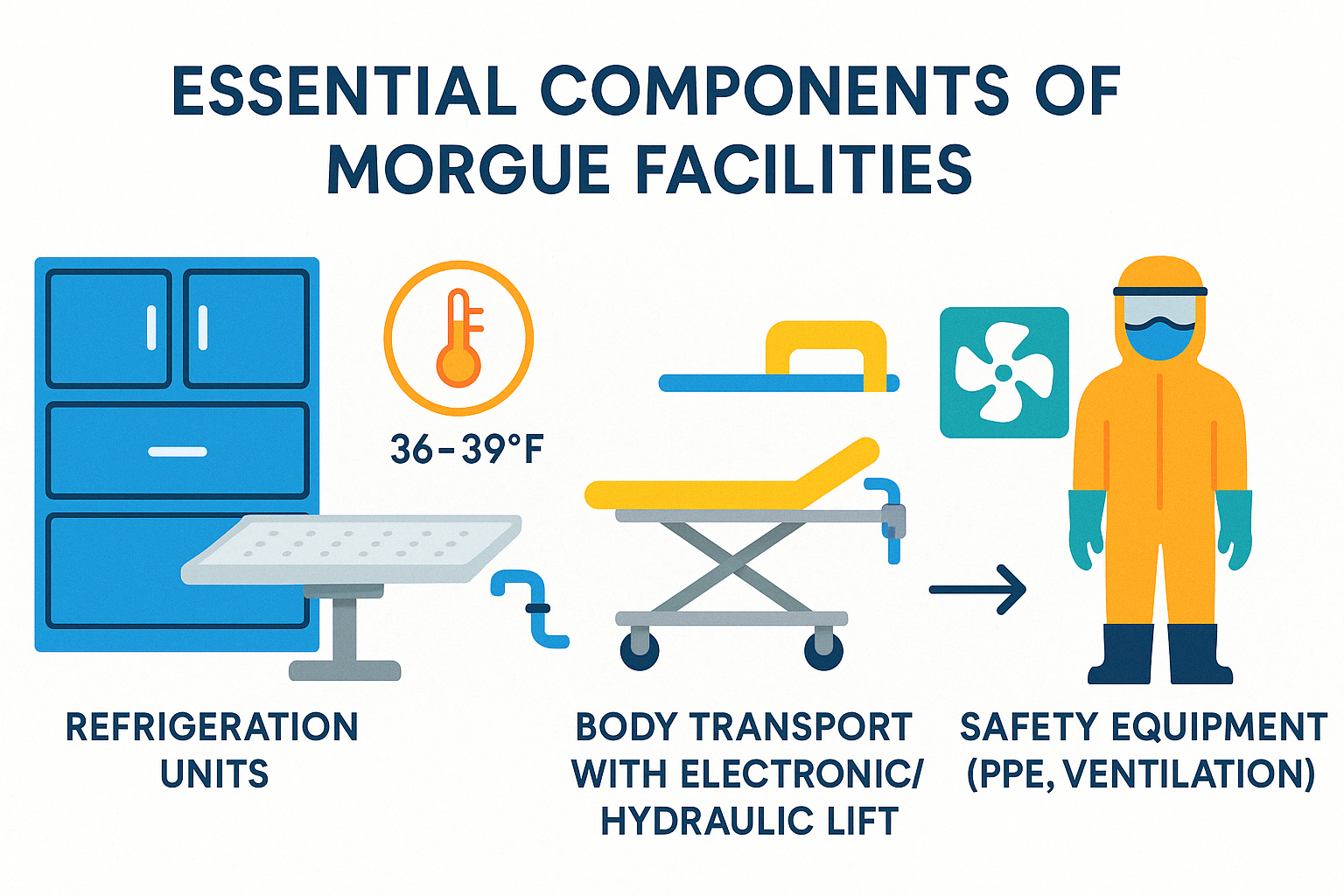
Essential Morgue Equipment: Tools of the Trade
Behind every dignified end-of-life service lies a carefully orchestrated process supported by specialized tools and equipment. These aren't just ordinary tools—they're instruments designed with both respect for the deceased and safety for those who care for them.
At American Mortuary Coolers, we see morgue equipment as the silent partner in the sacred work of afterlife care. Each piece serves a specific purpose in the journey from when someone passes until their final farewell.
"Having worked in the service industry for many years, our success is based on our long-held values: integrity, honesty, and service second to none," as one of our industry colleagues puts it. This philosophy guides the thoughtful design of every piece of equipment we provide.
Let's explore the essential tools that make this work possible across Tennessee, Georgia, New York, and everywhere else we proudly serve.
Autopsy Tables and Morgue Equipment Basics
The autopsy table stands at the heart of any morgue facility. Modern tables are crafted from medical-grade stainless steel, offering a seamless surface that's both durable and easy to sanitize—a must when working in environments where cleanliness is paramount.
What makes a quality autopsy table? It starts with thoughtful design. Seamless construction eliminates hiding places for bacteria. Integrated drainage systems efficiently channel fluids away, keeping the work area clean. Many tables now feature adjustable height mechanisms that reduce back strain during long procedures—because caring for the deceased shouldn't mean sacrificing staff wellbeing.
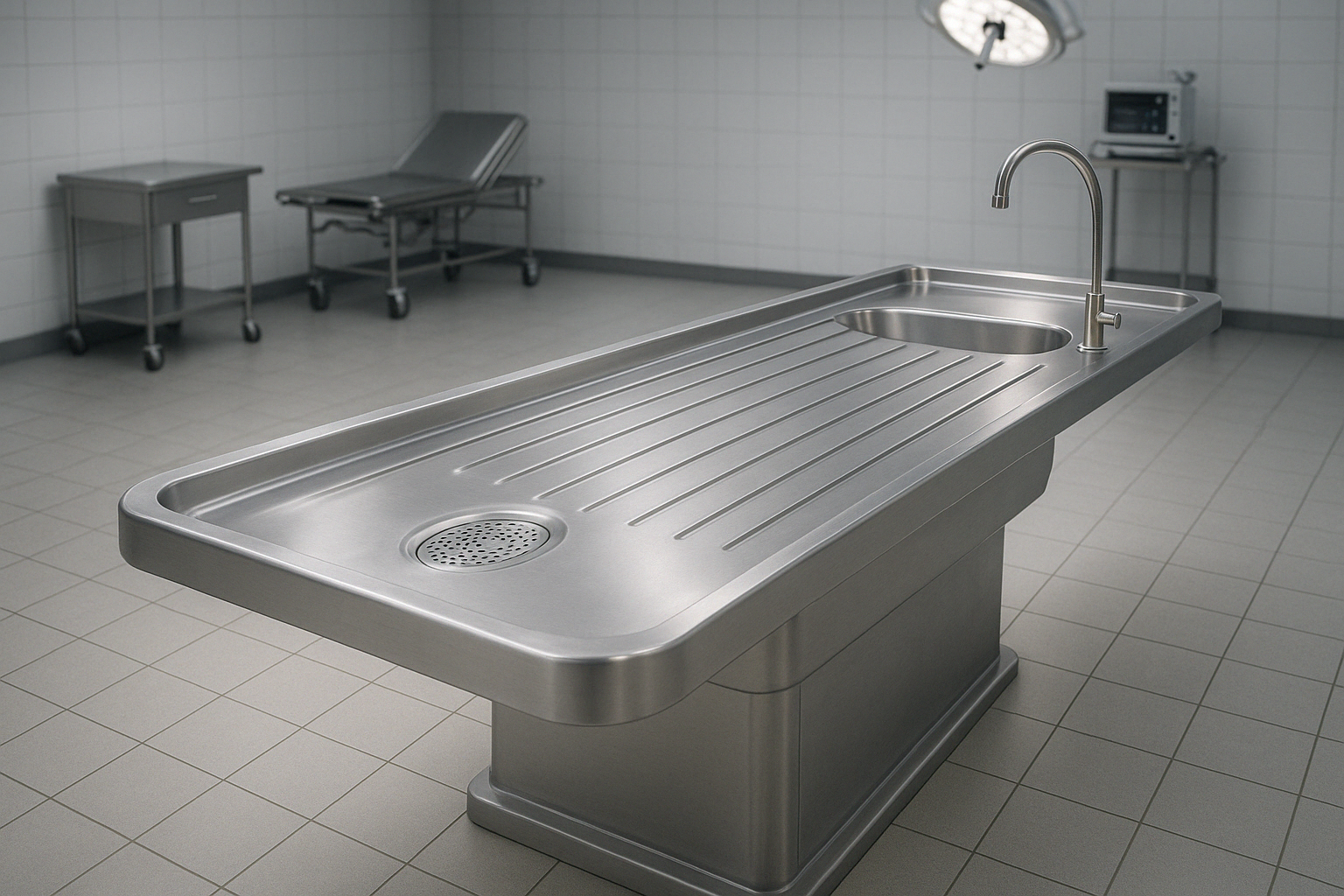
Modern tables have come a long way from their predecessors. Today's models often include perimeter rinse systems for continuous cleaning and built-in ventilation to remove potentially harmful vapors. Some facilities prefer pedestal models—tables anchored by a central support rather than four legs—which allow staff to move more freely around the work area.
"Quality autopsy tables are made with the medical examiner in mind," as equipment specialists often remind us. This user-centered approach ensures that every detail serves both function and comfort.
Mortuary Refrigeration Units: Preserving with Care
If tables are the heart of a morgue, refrigeration units are surely its soul. At American Mortuary Coolers, these specialized cooling systems are our passion and expertise.
Mortuary coolers maintain a precise temperature between 36°F and 39°F (2-4°C)—the sweet spot that slows natural processes without causing tissue damage. This careful preservation honors the deceased while giving families time to make arrangements without rushing through their grief.
We provide several cooling solutions to match different needs:
Walk-in coolers serve larger facilities, providing space for multiple bodies with organized rack systems. Reach-in units offer similar functionality in a more compact footprint. For individual storage, body boxes provide portable, single-person cooling. And when disaster strikes or capacity needs surge, mobile morgue trailers can be deployed quickly.
Today's mortuary coolers aren't just about performance—they're about efficiency too. Modern units use high-performance insulation that keeps temperatures steady while keeping energy bills manageable. Our 4-inch thick panels deliver R-values of 28, while our premium 5-3/8-inch panels reach an impressive R-value of 37.6—particularly valuable for our customers in warmer regions like Atlanta and Dallas.
"Ensuring high-quality insulation with a higher R-value is essential for reducing energy consumption long-term," as our engineering team often explains. It's not just good for the environment—it's good for your budget too.
For smaller facilities or those with fluctuating needs, our mobile body boxes offer flexibility without permanent installation—perfect for smaller funeral homes or temporary situations.
The Complete Guide to Mortuary Coolers and Requirements
Body Lifts and Transport Systems: Enhancing Cadaver Handling
Moving those in our care requires both respect and practical consideration. Modern morgue equipment includes thoughtfully designed transport systems that protect both the dignity of the deceased and the physical wellbeing of staff.
Hydraulic cadaver lifts have transformed this aspect of mortuary work, allowing a single person to safely raise and lower bodies without strain. Electric scissor lifts offer precise positioning when transferring between surfaces. Mortuary carts feature locking wheels and secure straps for safe movement throughout facilities, while specialized tools like the Ferno Model 65 Mortuary Scoop Stretcher help with retrievals from challenging locations.
These systems have become increasingly sophisticated over time. Many now accommodate bariatric cases with powerful lifting mechanisms—an important consideration as we serve all community members with equal dignity and care.
"Using body lifts and cadaver lifts to safely transfer bodies from the place of death to the mortuary and then to the cemetery is essential for both staff safety and maintaining the dignity of the deceased," as one of our funeral director clients recently shared with us. This equipment prevents workplace injuries while ensuring every person is handled with the same gentle respect.
At American Mortuary Coolers, we understand that different facilities have different needs. Whether you're running a small funeral home in Johnson City, TN, or managing a busy medical examiner's office in Chicago, our team can help you find the right body handling systems for your specific situation—because the right tools make all the difference in providing care that truly matters.
Materials Used in Morgue Equipment Construction
When it comes to creating equipment that serves both the living and the deceased with dignity, materials matter. At American Mortuary Coolers, we understand that the materials used in morgue equipment construction aren't just about durability—they're about creating spaces that honor the final journey with respect and care.
Stainless Steel: The Gold Standard
Walk into any modern morgue facility, and you'll immediately notice the gleaming presence of stainless steel. There's good reason this material has become the backbone of quality morgue equipment across the country, from busy medical examiners' offices in New York to small funeral homes in rural Tennessee.
Stainless steel offers an unbeatable combination of benefits that make it ideal for this sensitive environment. Its non-porous surface prevents bacteria from finding hiding spots, which is crucial when handling the deceased. The material stands up beautifully to the daily barrage of disinfectants, bodily fluids, and cleaning agents without corroding or degrading.
Most of our customers appreciate the professional appearance stainless steel provides—clean, bright, and reassuring to families who may visit preparation areas. But beyond appearances, its durability means equipment that lasts for decades rather than years, making it a wise investment for facilities of all sizes.
The industry generally relies on 304-grade stainless steel for most applications—it hits the sweet spot between excellent corrosion resistance and reasonable cost. For components regularly exposed to particularly harsh chemicals, we sometimes recommend upgrading to 316-grade stainless steel, which offers improved protection in extremely demanding environments.
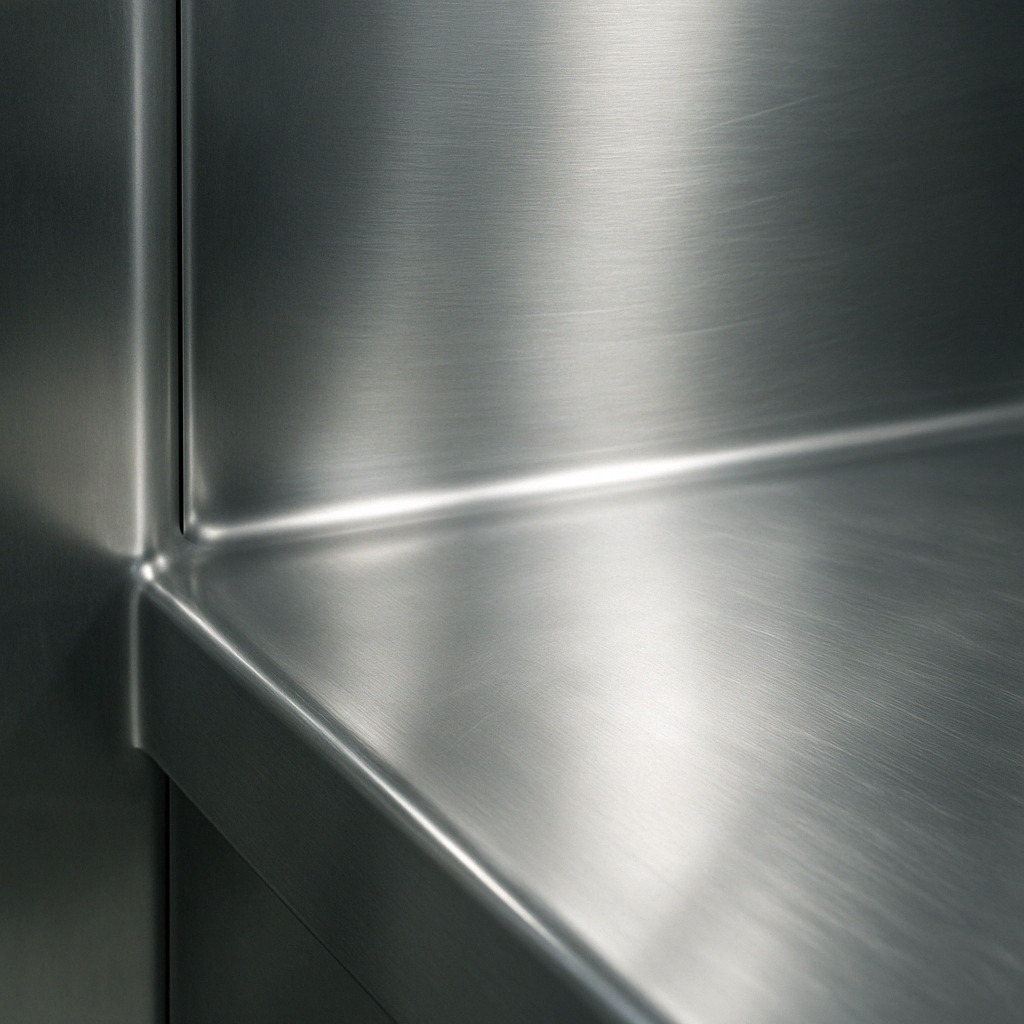
"Using advanced materials like stainless steel contributes to better infection control in environments where hygiene is critical."
What many people don't realize is the craftsmanship involved in creating seamless stainless steel components. Those smooth, uninterrupted surfaces aren't just about looks—they eliminate crevices where biological material might collect, significantly reducing infection risks for staff working in these environments.
Additional Materials for Specialized Applications
While stainless steel dominates our industry for good reason, it's not the only player on the field. Modern morgue equipment often incorporates several complementary materials, each bringing unique properties to the table.
Zinc-treated steel provides exceptional structural strength in areas where weight-bearing capacity is critical. You'll often find it in the frames of autopsy tables and body lifts, where it works behind the scenes to ensure stability and safety.
For components that regularly contact caskets, we often use PVC (polyvinyl chloride) to create a gentler interface. This prevents scratching or damaging the caskets that families have selected for their loved ones—a small but meaningful detail in providing respectful care.
Transport equipment benefits tremendously from composite aluminum/plastic construction. These materials create carts and stretchers that move quietly through hallways—a subtle but important feature when moving the deceased through areas where families might be present. The lightweight nature of these composites also reduces strain on staff during transport.
High-density polyethylene (HDPE) cutting boards have become standard in many facilities for dissection procedures. These surfaces are firm yet slightly yielding, which preserves the sharpness of cutting tools while being completely sanitizable between uses.
At American Mortuary Coolers, our mortuary refrigeration units showcase this thoughtful material selection. We use 26 GA Acrylume for both exteriors and interiors, creating surfaces that maintain their appearance even after years of service. Our cooler panels feature prefabricated insulated materials with metal cladding, delivering both structural integrity and excellent thermal efficiency.
The careful selection of these materials reflects our broader commitment to creating morgue equipment that serves both practical and human needs—equipment that works reliably while helping staff provide care with dignity and respect.
Ensuring Safety and Hygiene in the Morgue
Working in a morgue environment requires an unwavering commitment to safety and hygiene. The morgue equipment we design at American Mortuary Coolers isn't just functional—it's built with the wellbeing of both staff and the deceased in mind.
Comprehensive Safety Protocols
Behind every well-run morgue facility is a set of thorough safety protocols. Think of it as an invisible shield protecting everyone who walks through those doors. Proper ventilation systems quietly work in the background, whisking away potentially harmful vapors and odors that could otherwise linger in the air.
Good drainage isn't just about cleanliness—it's a safety essential that channels fluids away from work areas, preventing the slip hazards that can lead to serious injuries. We've seen how thoughtfully designed drainage systems can make all the difference in busy facilities.
"Ensuring high quality and timely delivery is a critical factor in lab equipment management," as industry experts often remind us. This rings especially true when it comes to the safety equipment that morgue personnel rely on every single day.
The ergonomics of morgue equipment might not be the first thing people think about, but anyone who's spent hours performing detailed work understands the importance. Equipment designed with body mechanics in mind prevents the kind of chronic strain that can lead to lasting injuries.
Personal Protective Equipment (PPE)
The right PPE serves as the frontline defense for morgue personnel. Many technicians develop their own personal routines for gearing up—some prefer double-layering gloves for that extra peace of mind, while others have specific preferences for face shield styles that give them optimal visibility during procedures.
Waterproof aprons and gowns shield clothing from contamination, while proper respiratory protection filters out harmful particles that could otherwise be inhaled. For facilities dealing with particularly concerning infectious cases, advanced systems like the MaxAir CAPR® provide that next level of protection without sacrificing comfort during those long shifts.
Those humble shoe covers? They're actually a critical part of containment strategy, preventing potentially hazardous materials from being tracked beyond designated work areas. It's these seemingly small details that contribute to the bigger picture of comprehensive safety.
Equipment Design for Improved Safety
When we design morgue equipment at American Mortuary Coolers, we think about safety in every curve and corner—literally. Those rounded edges on our equipment aren't just aesthetically pleasing; they eliminate sharp corners that could tear protective gear or cause injuries during busy moments.
Splash guards integrated into autopsy tables show thoughtful design in action, containing fluids during procedures rather than allowing them to splash onto personnel. Similarly, non-slip surfaces provide that crucial bit of traction in areas where floors might become wet, preventing the kinds of falls that can lead to serious injuries.
Height-adjustable features might seem like a luxury, but they're actually essential for preventing the back strain that comes from hours of working at an improper height. And hands-free operation wherever possible reduces the need to touch potentially contaminated surfaces, cutting down on cross-contamination risks.
Best Practices for Morgue Safety and Hygiene
The safest morgue facilities maintain clear boundaries between clean and contaminated areas. This separation isn't always about physical walls—sometimes it's about well-established workflows and protocols that everyone understands and follows.
Regular cleaning schedules using appropriate disinfectants keep surfaces safe, while proper staff training ensures everyone knows how to operate equipment safely and respond to potential hazards. Regular maintenance checks on ventilation and drainage systems prevent the kind of failures that could compromise safety.
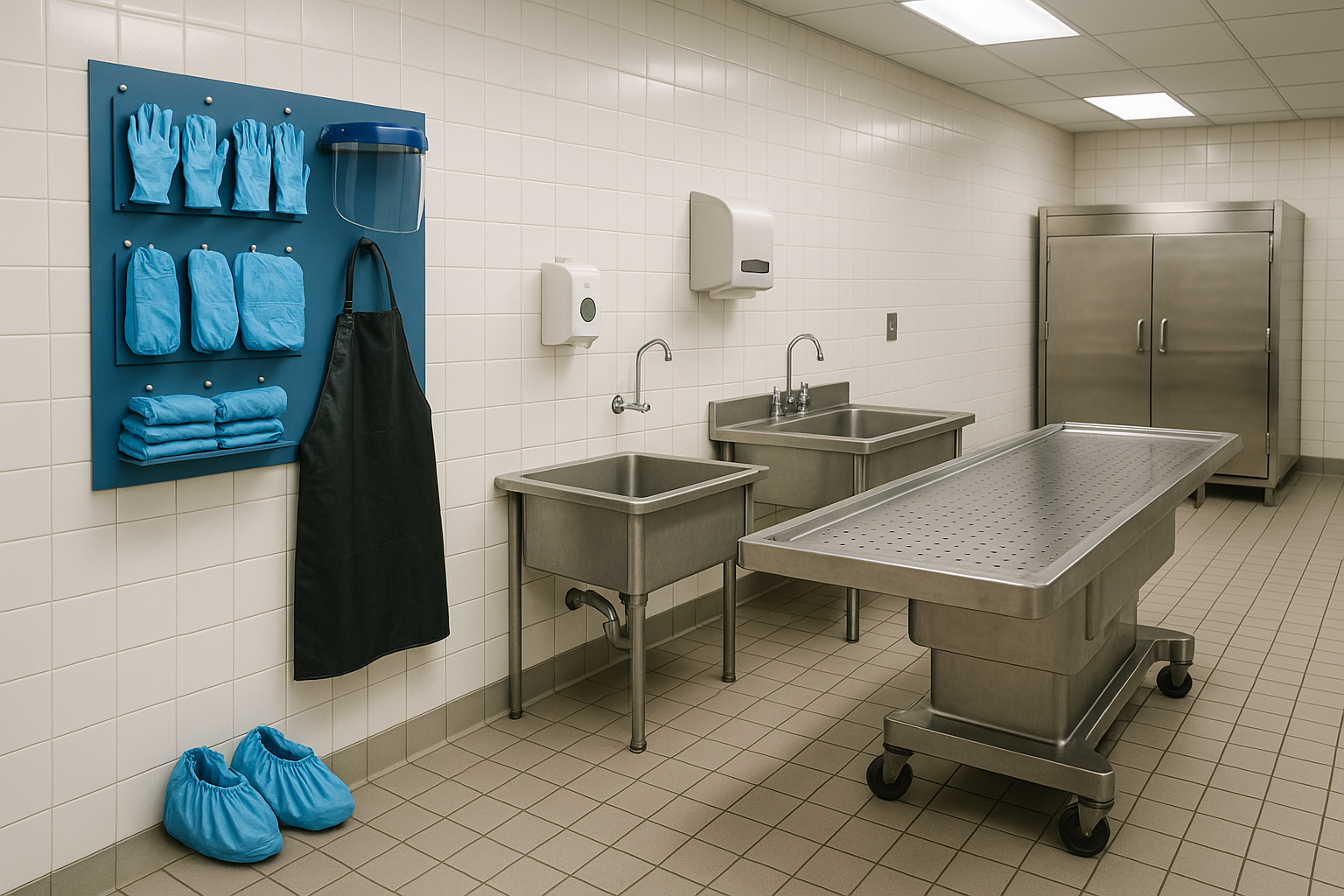
At American Mortuary Coolers, we build safety features into every unit we create. From the floor drains that prevent standing water to the easy-to-clean surfaces that simplify disinfection, our refrigeration units are designed to create a safer working environment. Whether you're operating a facility in the chilly Northeast or the warm Pacific coast, our equipment helps you maintain the highest standards of safety and hygiene while caring for the deceased with dignity.
Innovations in Morgue Equipment Technology
The world of mortuary science isn't static – it's constantly evolving with new technologies that make the challenging work of caring for the deceased more dignified and efficient. Today's morgue equipment looks quite different from what you might have seen even a decade ago, with smart features that would have seemed like science fiction to previous generations of funeral professionals.
Digital Monitoring and Control Systems
Remember the days of checking analog thermometers and hoping your cooler was maintaining the right temperature? Those days are thankfully behind us. Modern mortuary refrigeration systems now come with digital brains that do the worrying for you.
These smart systems constantly monitor temperatures, sending alerts directly to your phone if anything falls outside the crucial 36-39°F range needed for proper preservation. Many of our customers at American Mortuary Coolers appreciate being able to check on their units remotely, especially during holidays or after hours.
"The peace of mind from knowing exactly what's happening with our coolers at all times has been invaluable," one funeral director told us recently. "I can actually enjoy my weekend without worrying about potential equipment issues."
Beyond just monitoring, these systems also automatically adjust cooling systems when needed, maintaining perfect conditions while recording all temperature data for your records – something increasingly important for regulatory compliance.
Ergonomic Advancements
The physical toll of mortuary work has always been significant. That's why we're seeing so many innovations focused on protecting the health of the professionals who use morgue equipment every day.
Today's autopsy tables feature hydraulic systems that adjust to the perfect height with the touch of a button, reducing the back strain that comes from hours of leaning over at an uncomfortable angle. Power-assisted body lifts now make it possible for a single person to safely move a deceased individual with minimal physical strain.
Even the handles on transport equipment have been redesigned to provide better grip and control, while lightweight materials reduce the force needed to move the deceased. The ErgoTek laboratory benches exemplify this human-centered approach to design, with adjustable features that accommodate staff members of different heights and physical capabilities.
These ergonomic improvements aren't just about comfort – they're helping extend careers and prevent the chronic injuries that have historically been common in the funeral profession.
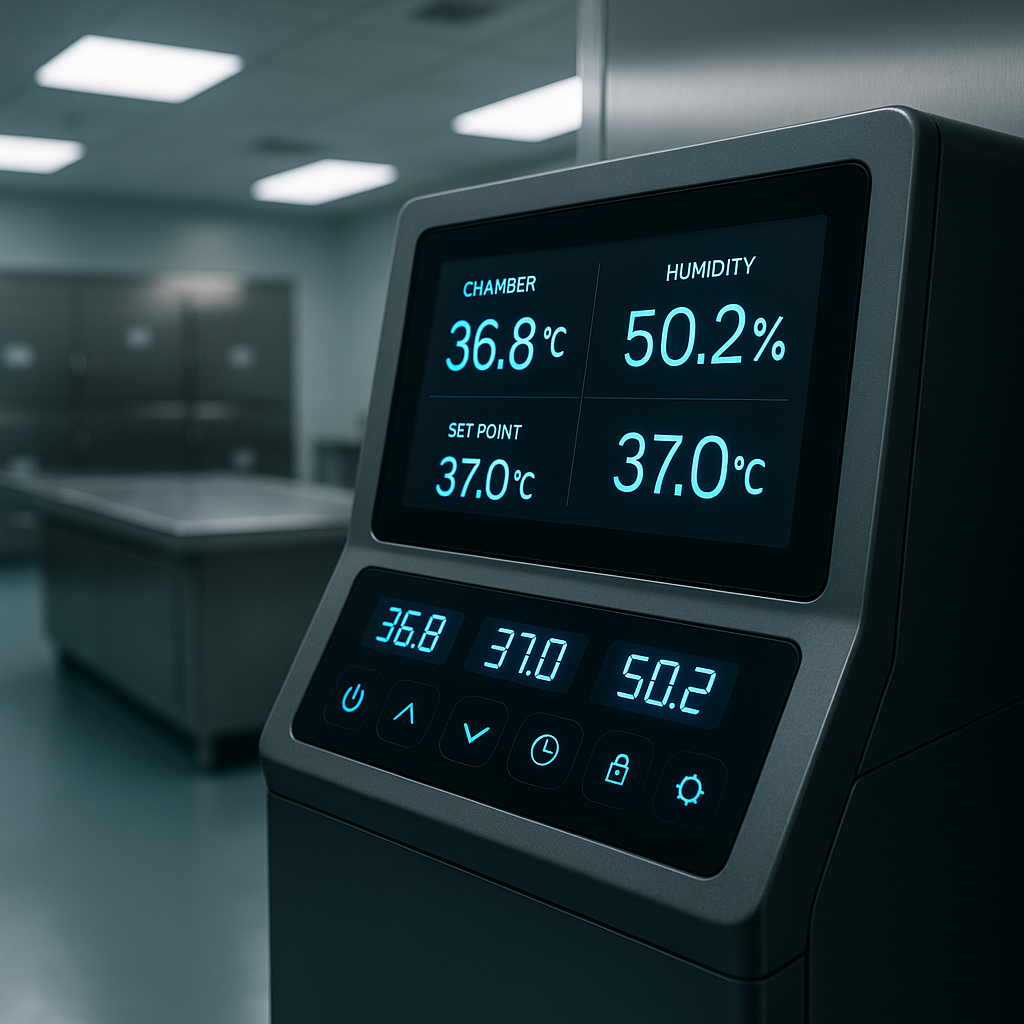
Energy Efficiency Improvements
Running a funeral home or morgue facility comes with significant operational costs, and electricity is a major component. That's why we've seen such a focus on making morgue equipment more energy-efficient in recent years.
At American Mortuary Coolers, our 5-3/8" thick panels deliver an impressive R-value of 37.6, significantly reducing the energy needed to maintain proper temperatures. When combined with high-efficiency compressors and LED lighting (which runs cooler and uses less power), these improvements can make a real difference in monthly utility bills.
Some of our most forward-thinking customers are even connecting their mortuary refrigeration systems to solar power, creating a sustainable approach to operations that aligns with the growing environmental consciousness in the funeral industry.
"We've cut our electricity costs by nearly 30% since upgrading to energy-efficient equipment," shared one medical examiner's office that recently modernized their facility. "The savings alone justified the investment, not to mention the reduced environmental impact."
Integrated Imaging and Documentation
Documentation has always been important in mortuary settings, but today's digital tools make the process faster and more accurate than ever before.
Modern autopsy stations often include integrated camera systems that capture high-resolution images during examinations. These systems can include digital measurement tools that provide precise sizing of findings and annotation capabilities that allow for detailed notes to be added directly to images.
The Mopec PathCam Imaging System represents this digital change, offering a dedicated solution that streamlines the documentation process while ensuring all records are securely stored with appropriate privacy protections.
For medical examiners and pathologists, these integrated systems mean less time spent on paperwork and more time focused on the important work of determining cause of death and supporting families with answers.
Material Science Advancements
The materials used in morgue equipment have come a long way, with science delivering surfaces that are not just durable but actively contribute to safety and hygiene.
Antimicrobial surfaces that inhibit bacterial growth between cleanings are becoming standard in high-quality equipment. Chemical-resistant finishes now withstand years of exposure to harsh disinfectants without degrading, while improved sealants ensure truly seamless construction that leaves nowhere for contaminants to hide.
We're also seeing more sustainable material options that reduce environmental impact without sacrificing performance – an important consideration as more funeral homes accept green practices.
At American Mortuary Coolers, we're constantly evaluating these new materials to ensure our products represent the best options available for our customers, whether they're located in busy urban centers like Chicago and New York or serving smaller communities across the country.
The future of morgue equipment looks promising, with innovations that continue to improve dignity in death care while making the important work of funeral professionals safer, more efficient, and more sustainable.
Customizing Morgue Equipment to Meet Facility Needs
Every funeral home, morgue, and pathology department has its own unique challenges and requirements. That's something we've learned at American Mortuary Coolers while serving facilities from small-town funeral homes to big-city medical examiners' offices. The beauty of modern morgue equipment is that it can be custom to fit exactly what your facility needs.
Modular Design Approaches
Gone are the days of one-size-fits-all morgue solutions. Today's modular approaches mean you can build a system that grows with your facility.
Think of modern morgue equipment like building blocks that can be arranged and rearranged as your needs change. Start with essential components and add more as your budget allows. Need to expand your refrigeration capacity next year? No problem – modular systems make this possible without replacing everything you've already invested in.
"Mopec specializes in designing customized solutions for hospitals, universities and morgues," notes an industry leader, highlighting how important custom approaches have become in our field.
The beauty of modularity is flexibility. Your workspace can evolve as your needs change, whether that means accommodating higher case volumes or incorporating new technologies as they become available.
Custom Configurations for Specific Needs
When it comes to refrigeration units – our specialty at American Mortuary Coolers – the customization options are practically endless. We've worked with facilities that needed wide 48" doors for bariatric cases and others that preferred side-loading configurations to maximize space in narrow rooms.
Flooring is another area where customization makes a big difference. A busy medical examiner's office might need heavy-duty flooring with diamond tread plate for durability, while a smaller funeral home might prefer smooth stainless steel for easier cleaning.
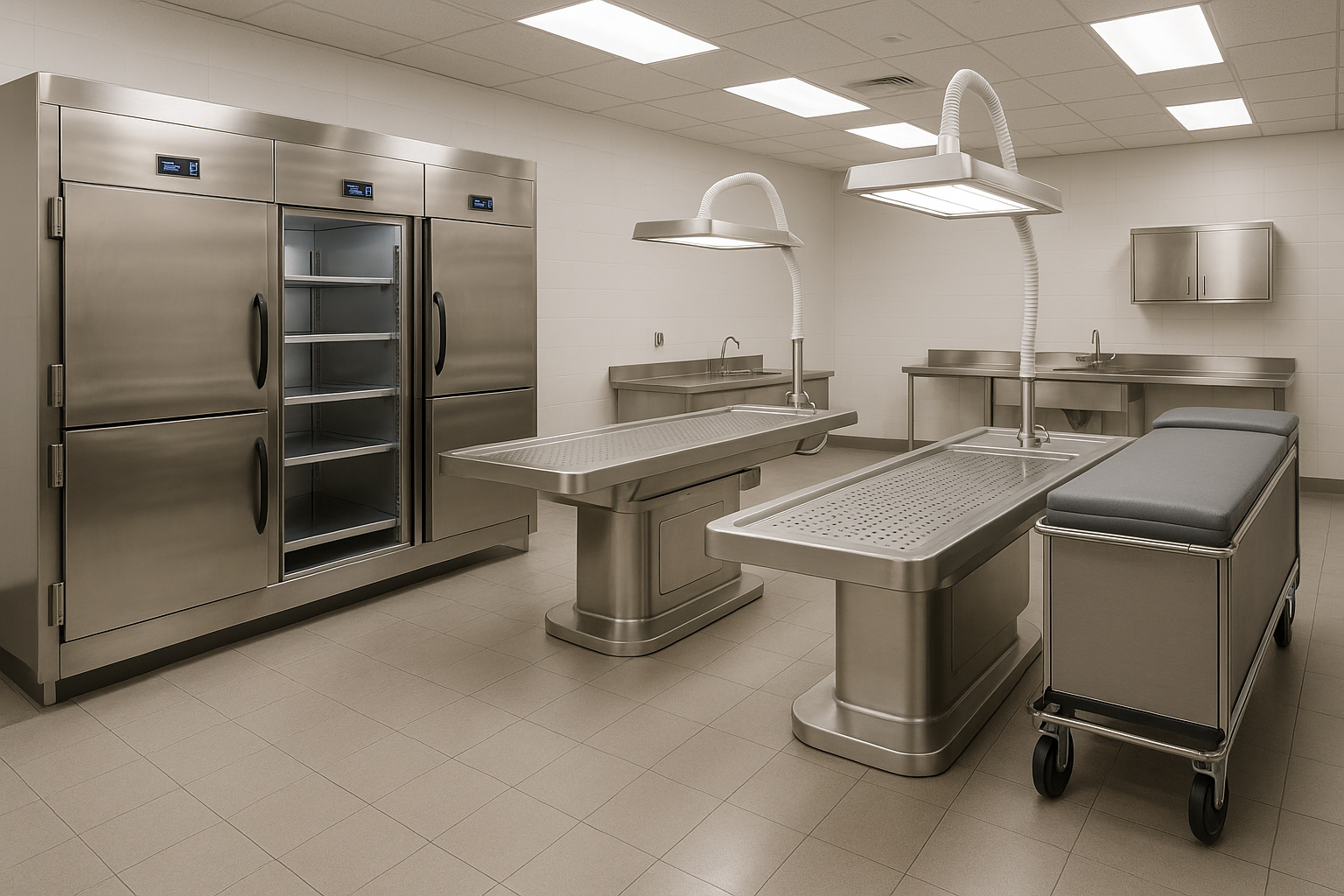
Autopsy and preparation tables benefit tremendously from customization too. Some facilities prefer integrated downdraft ventilation systems that pull fumes downward and away from technicians, while others need specialized sink configurations to accommodate their existing plumbing. We've even designed custom height tables for facilities with particularly tall or short staff members to reduce back strain.
Transportation systems can be customized with different weight capacities – a critical consideration as bariatric cases become more common. The maneuverability features can also be custom to your facility's layout. Tight corners and narrow hallways might require specialized caster configurations for easier navigation.
"The equipment features seamless, polished stainless steel fabrication designed for easy cleaning and reduced bacterial growth," industry experts note. This attention to detail in customization doesn't just improve functionality – it improves safety and hygiene too.
Regional Customizations
Working across the contiguous 48 states has taught us how regional differences impact equipment needs. Facilities in Phoenix or Dallas face very different climate challenges than those in Chicago or Seattle.
For our customers in hot, humid regions like Florida or Louisiana, we recommend improved insulation and more powerful cooling systems. Our 5-3/8" thick panels with an R-value of 37.6 make a tremendous difference in energy efficiency in these areas.
Urban facilities in New York or San Francisco often face serious space constraints. For these customers, we design compact, space-efficient solutions that maximize body capacity without requiring additional square footage.
Regulatory requirements vary by state too. What works in Tennessee might not meet the specific regulations in California or Massachusetts. Our team stays up-to-date on these requirements to ensure your customized equipment is fully compliant with local laws.
Keeping It Cool: A Roundup of the Best Morgue Coolers
Workflow Efficiency Improvements
Perhaps the most important benefit of customized morgue equipment is how it can transform your facility's workflow. We've seen properly designed equipment cut hours off weekly workloads by simply reducing unnecessary movement and streamlining processes.
Imagine a preparation room where everything is within easy reach – no more walking back and forth across the room dozens of times per case. Or refrigeration units positioned to minimize transport distances from intake areas to preparation rooms.
Digital integration is another area where customization shines. Modern systems can incorporate documentation stations right where the work happens, eliminating the need to move to a separate desk to complete paperwork or enter data.
One of our favorite success stories involves a medium-sized funeral home that completely redesigned their preparation area with custom equipment. By integrating related functions into combined workstations, they reported saving nearly 10 hours of staff time per week – time they could dedicate to better serving families instead of unnecessary walking and equipment handling.
At American Mortuary Coolers, we believe that your equipment should work for you, not the other way around. That's why we take the time to understand your specific needs before recommending solutions. Whether you're in a small town in Maine or a major medical center in California, we're committed to creating morgue equipment that fits your facility perfectly.
Choosing the Right Morgue Equipment for Your Facility
Selecting the perfect morgue equipment for your facility isn't just about finding items that fit your budget—it's about creating a dignified environment for the deceased while ensuring your staff can work safely and efficiently. At American Mortuary Coolers, we've helped countless funeral homes and medical facilities across the country make these important decisions.
Key Considerations in Equipment Selection
When our customers call us about upgrading their morgue equipment, we always start by asking about their specific needs. Every facility is unique, and what works for a large medical examiner's office in Chicago won't necessarily be right for a small funeral home in rural Tennessee.
First, think about your facility's day-to-day operations. How many deceased individuals do you typically care for at once? What about during your busiest periods? The last thing you want is to invest in refrigeration units that leave you scrambling for space during unexpected surges.
Available space is another crucial factor. We've worked with facilities of all sizes—from spacious purpose-built morgues to compact funeral homes where every square inch matters. Your equipment needs to fit comfortably within your space while still allowing staff to move around safely.
The types of services you provide will heavily influence your equipment needs. If you're performing autopsies, you'll need specialized tables with proper drainage and ventilation. If you're primarily focused on preparation for viewing, your priorities might lean more toward gentle body handling systems and appearance-preserving refrigeration.
Budget constraints are always a reality, but we encourage our customers to think about the long-term investment. As one funeral director told us, "I wish I'd spent the extra money on better equipment from the start—I ended up spending more on repairs and eventually replacement anyway."
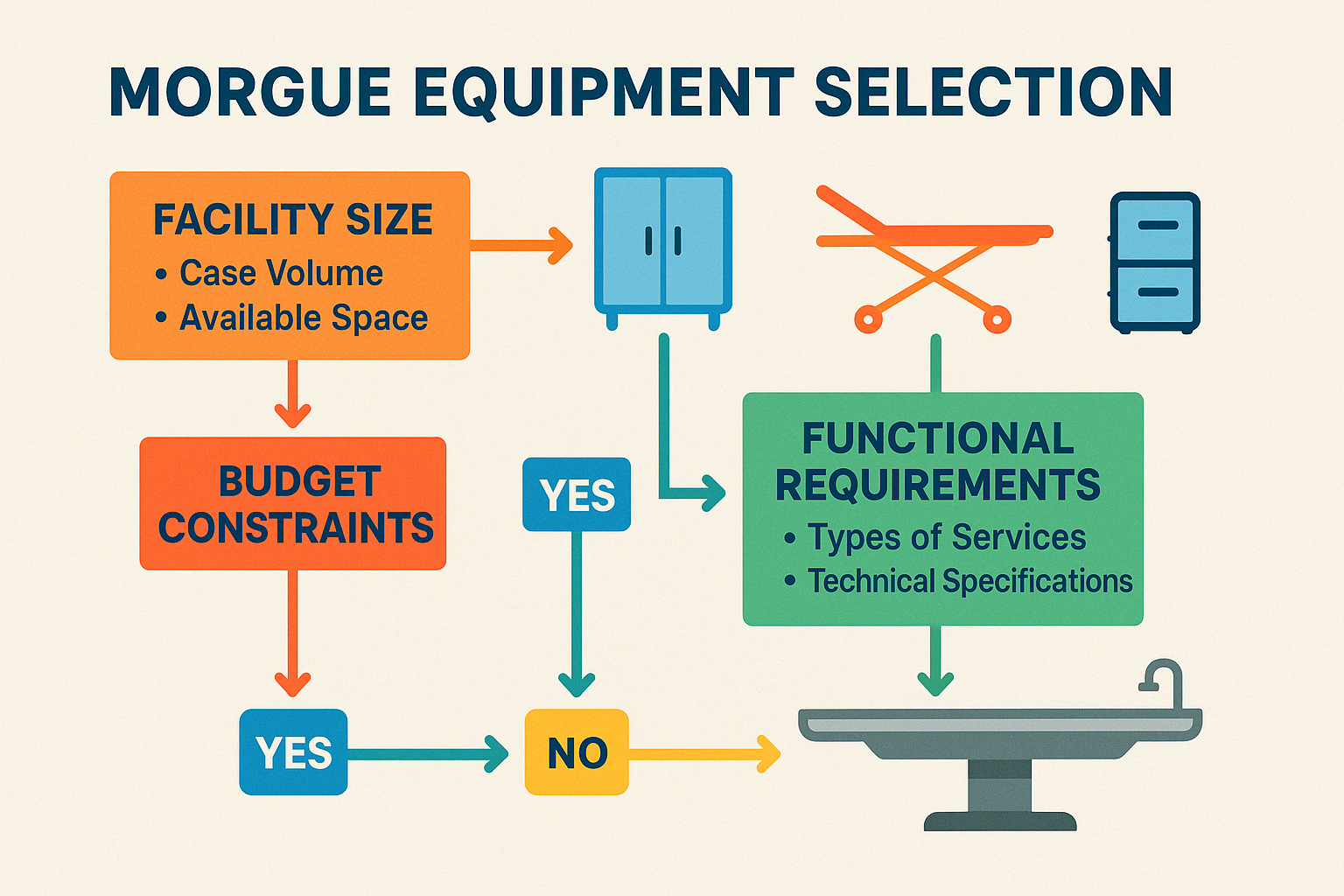
When examining technical specifications, pay close attention to capacity requirements—both in terms of physical dimensions and weight limits. With the increasing prevalence of bariatric cases, many facilities are finding their older equipment inadequate for today's needs.
Material quality makes a tremendous difference in longevity. The grade of stainless steel used in your morgue equipment affects not just how it looks, but how it performs after years of cleaning with harsh disinfectants. Our mortuary coolers feature high-quality 26 GA Acrylume exteriors and interiors precisely because we know the punishment this equipment takes over its lifetime.
Don't forget to consider the practical aspects of installation and operation. Will your existing utilities support the new equipment? Will you need special electrical connections or plumbing modifications? These hidden costs can surprise unprepared buyers.
Evaluating Equipment Impact on Workflow
The way your morgue equipment is arranged can make or break your daily operations. We've seen facilities where staff had to move bodies multiple times unnecessarily because equipment wasn't thoughtfully positioned. This not only increases physical strain but also compromises dignity in care.
"The equipment is specifically engineered to improve efficiency in body handling while minimizing unnecessary lifting and infection risks," notes industry experts. This efficiency isn't just about convenience—it directly affects staff safety and wellbeing.
Think about how bodies move through your facility from arrival to final disposition. Each transition should be smooth, with equipment heights matched to minimize lifting. Storage units should be positioned to reduce transport distances, and preparation areas should have everything technicians need within easy reach.
Proper documentation is another workflow consideration. Modern morgue equipment often includes features that support record-keeping, from simple ID systems to integrated digital documentation stations. These features can save valuable time while reducing errors.
Budget Considerations and Long-Term Value
When customers tell us they're working with a tight budget, we always encourage them to look beyond the initial price tag. A cheaper refrigeration unit that consumes more electricity can cost thousands more over its lifetime. Equipment that breaks down frequently disrupts operations and requires expensive emergency repairs.
Think of quality morgue equipment as an investment rather than an expense. Premium construction materials, better insulation, and advanced temperature controls might increase upfront costs, but they typically deliver significant savings through:
- Lower energy bills month after month
- Reduced maintenance needs and fewer emergency repairs
- Longer useful life before replacement becomes necessary
- Better preservation results and fewer complications
- Improved staff efficiency and reduced physical strain
At American Mortuary Coolers, we've delivered equipment to facilities from Miami to Seattle, and we've seen how quality equipment performs in different environments. Our customers in hot, humid regions particularly appreciate our superior insulation (with R-values up to 37+) when they receive their electric bills.
Comparison of Key Equipment Features
When comparing different options, it helps to understand what separates basic models from premium solutions. Here's how the market generally breaks down:
| Feature | Basic Models | Mid-Range Options | Premium Solutions |
|---|---|---|---|
| Construction Material | Standard stainless steel | Higher-grade stainless with reinforcement | Seamless construction with antimicrobial properties |
| Temperature Control | Manual adjustment | Digital controls | Automated systems with remote monitoring |
| Energy Efficiency | Standard insulation | Improved insulation (R-value 28) | Maximum insulation (R-value 37+) with energy-saving features |
| Capacity | Fixed configuration | Modular options | Fully customizable with expansion potential |
| Safety Features | Basic requirements met | Improved ergonomics | Comprehensive safety systems with digital monitoring |
| Warranty | 1-2 years limited | 3-5 years parts and labor | Extended coverage with preventive maintenance |
| Price Range | $ | $$ | $$$ |
The "best" option isn't necessarily the most expensive one—it's the one that best meets your specific needs while providing reliable service for years to come. Sometimes a mid-range solution with the right customizations will serve you better than a premium model with features you'll never use.
We've found that most facilities benefit from investing in the highest quality they can reasonably afford for their core equipment (especially refrigeration units), while being more budget-conscious with secondary items that see less use or stress.
Whatever your needs and budget, we're here to help you find the right morgue equipment solution for your facility—whether you're in Nashville, Tennessee or anywhere across the continental United States.
Frequently Asked Questions about Morgue Equipment
What are the most essential pieces of morgue equipment?
When setting up a morgue or funeral facility, certain equipment stands out as absolutely necessary. The backbone of any morgue is its morgue equipment, with refrigeration units being perhaps the most critical component. These specialized coolers maintain bodies at the ideal 36-39°F range, slowing decomposition while preserving tissues in their natural state.
Next in importance are autopsy or preparation tables, typically crafted from high-grade stainless steel with integrated drainage systems. These tables provide the sanitary, durable surface needed for examinations and preparation procedures. The quality of these tables directly impacts both staff comfort and the dignity with which the deceased are handled.
Body transport and lift systems might not be as visible to families, but they're essential behind the scenes. These systems allow staff to move the deceased with respect while protecting themselves from potential back injuries. Modern lift systems can be operated by a single person, even when handling heavier individuals.
Personal protective equipment rounds out the essentials list. From multi-layered gloves to face shields, waterproof gowns and respiratory protection, PPE safeguards the health of morgue staff while preventing cross-contamination.
For facilities that perform autopsies, specialized dissection instruments complete the essential toolkit. These precision-crafted tools include scalpels, scissors, specialized saws, and forceps designed specifically for postmortem examinations.
Smaller funeral homes without autopsy services might focus primarily on quality refrigeration, preparation tables, and transport systems, while medical examiner offices typically require the full spectrum of equipment.
How does the design of morgue equipment impact workflow efficiency?
The thoughtful design of morgue equipment can transform a morgue's operations, creating smoother workflows and reducing staff fatigue. When equipment is strategically placed, the distance bodies must travel between procedures is minimized, creating a more dignified process while saving valuable time.
Height-adjustable tables and power-assisted lifts make a world of difference for staff who work long hours. These ergonomic features reduce physical strain, decreasing fatigue and lowering the risk of workplace injuries that could sideline valuable team members.
"The product range is specifically engineered to improve efficiency in body handling while minimizing unnecessary lifting and infection risks," note industry experts. This efficiency isn't just about productivity—it directly impacts a facility's ability to provide timely, dignified care.
Integration between different equipment types creates seamless transitions. For example, transport systems that align perfectly with table heights eliminate awkward transfers, while refrigeration units with compatible tray systems allow for smooth movement of the deceased between storage and preparation areas.
At American Mortuary Coolers, we design our refrigeration units with these workflow considerations in mind. We understand that in Tennessee, Georgia, or anywhere across our service regions, a well-designed cooler must work harmoniously with other equipment in the morgue or funeral home.
Even seemingly small details like easily accessible controls and thoughtful storage solutions can significantly impact daily operations. When staff don't waste time searching for tools or struggling with equipment adjustments, they can focus more fully on providing dignified care.
What are the considerations for choosing the right morgue equipment?
Selecting the right morgue equipment requires balancing several important factors. First, honestly assess your facility's case volume and types. A small funeral home in rural Tennessee has different needs than a major medical examiner's office in Chicago. Consider not just your average caseload but also your peak capacity needs during unusual circumstances.
Available space often becomes a limiting factor. Equipment must fit within your facility's physical constraints while allowing adequate workspace around each piece. We've seen many facilities struggle with oversized equipment that creates cramped, inefficient workspaces.
Budget constraints naturally influence decisions, but it's important to consider both initial purchase costs and long-term operational expenses. As one industry analysis puts it: "Investing in premium mortuary equipment is framed as a way to save money in the long run by avoiding the stress and costs of using outdated or worn-out tools." A slightly higher upfront investment often pays dividends through energy efficiency, durability, and reduced maintenance needs.
Your staff's capabilities should also guide equipment selection. Equipment should match the training and physical abilities of the personnel who will use it daily. The most advanced features add no value if your team finds them confusing or difficult to use.
Regulatory requirements vary by location, making it essential to verify that all equipment meets applicable health, safety, and industry standards for your specific jurisdiction. This is particularly important for refrigeration units, which may have specific temperature monitoring and documentation requirements.
Consider your future needs too. If you anticipate growth or service changes, selecting equipment with some flexibility or expansion capacity could save you from premature replacement costs down the road.
Energy efficiency, particularly for refrigeration units, represents a significant ongoing cost that many facilities underestimate. At American Mortuary Coolers, we help customers understand the long-term operating costs of different insulation values and cooling systems.
Finally, don't overlook maintenance support. The availability of service technicians and replacement parts in your area is crucial for minimizing downtime if issues arise. Equipment that sits unusable while awaiting repairs disrupts operations and can damage your facility's reputation for reliability.
Conclusion
The world of morgue equipment truly represents a specialized field where dignity, safety, and efficiency come together in perfect harmony. Throughout this guide, we've taken a journey through the essential tools that make compassionate afterlife care possible.
From the refrigeration units that give families time to say goodbye properly to the thoughtfully designed autopsy tables that help medical examiners find answers, each piece of equipment serves a meaningful purpose. The transport systems that allow for gentle, respectful movement of loved ones complete this chain of care that happens largely behind the scenes.
What strikes me most about modern mortuary equipment is how it blends practicality with respect. The gleaming stainless steel surfaces aren't just about durability \u2013 they represent a commitment to treating the deceased with dignity through cleanliness and care. The ergonomic features aren't merely conveniences; they're acknowledgments that the people who serve in this profession deserve protection and comfort as they perform their essential work.
As of 2025, the industry continues to benefit from breakthroughs in digital monitoring, advanced insulation materials, and ergonomic designs that further improve the safety, efficiency, and dignity of afterlife care. For a deeper overview of morgues in general, see Morgue (Wikipedia).
Here at American Mortuary Coolers, we feel privileged to be part of this tradition of respect and innovation. Our team works with funeral homes, medical examiners' offices, and pathology departments across the entire continental United States, bringing our expertise from our locations in Johnson City TN, Atlanta GA, Chicago IL, and beyond to facilities just like yours.
We understand that choosing the right morgue equipment isn't a simple task. It's a careful balancing act between immediate needs and future growth, between budget realities and quality requirements, between available space and optimal workflow. That's why we don't just sell products \u2013 we build relationships with our customers to ensure they find solutions that truly work for their unique circumstances.
The equipment choices you make today will shape your facility's operations for years to come. By investing in quality construction and appropriate customization, you create an environment that not only meets practical needs but also upholds the sacred trust placed in you by families during their most vulnerable moments.
For more information about how we craft custom solutions for the funeral industry, please visit:
American Mortuary Coolers: Crafting Custom Solutions for the Funeral Industry
Behind those mortuary doors, compassionate professionals continue their essential work day after day. We're truly honored to provide the tools that support this meaningful purpose, and we look forward to serving you with the same care and attention that you provide to families in their time of need.



